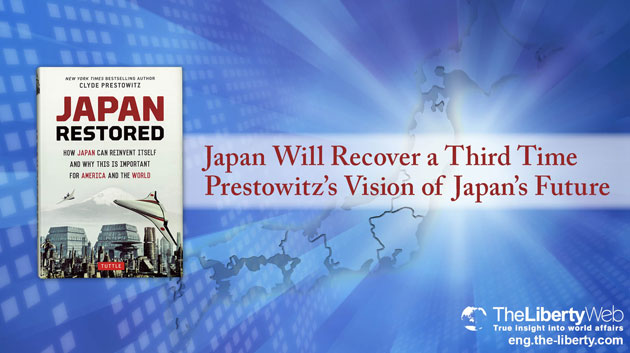Book Review: “Japan restored” by Clyde Prestowitz
Prestowitz's Vision of Japan's Future
Clyde Prestowitz was a negotiator with Tokyo while serving as Counselor to the Secretary of Commerce in the Reagan Administration. He was well known as a Japan-basher, who was seriously concerned with Japan’s stagnation. Despite criticisms that Japan’s economy would never recover, Prestowitz has now published a book, “Japan Restored”, which envisions Japan as a world leader thirty-four years into the future.
Prestowitz envisions Japan in the year 2050, where the country has recovered from its low point in 2016 and has tripled its GDP, now surpassing China as a world leader with supersonic jetliners, low-cost energy sources, the latest robotic technology and medical services, birthrate recovery, more women and ethnic people in the workforce, and a bilingual culture that helps spread Japan’s strengths around the world.
There is a catch, however. Many impending dangers threaten Japan’s ideal future: the blockade of the Strait of Hormuz, China’s occupation of the Senkaku Islands, Okinawa’s independence and subsequent unity with the Korean Peninsula under China’s rule, and economic contraction due to the failure of Abenomics. Until now Japan has found reason for improvement through dramatic external forces such as the Meiji Restoration and WWII. Prestowitz thinks that Japan will undergo the third major recovery, this time from the dangers of China and North Korea’s military power.
It is disappointing to think that some people do not believe Japan can recover unless it experiences this security crisis. Prestowitz has previously stated that if Japan wanted to become a respected leader, it must stop depending on the U.S. for defense, and form alliances with neighboring Asian countries. Long before Trump raised the issue of the unilateral nature of the U.S.-Japan alliance, Prestowitz had been asking what makes us expect that the U.S. Seventh Fleet will still be the police of the Pacific in 2050?
This argument is well founded. Stephen Walt of Harvard University and John Mearsheimer of Chicago University have proposed the offshore balancing strategy, where the U.S. military retreat to Hawaii and only intervene when problems arise in Asia. Christopher Layne of Texas A&M University thinks that this strategy will mean arming Japan, South Korea and Germany with nuclear armaments.
In his book, Prestowitz says that in 2017 Japan will abrogate Article 9 of the Constitution, doubles national defense expenses, and forms a Pacific-Indian Ocean mutual security alliance with India, Australia and the U.S. This would allow Japan to take hold of a counterplan to China’s encirclement network.
Japan has now strengthened its diplomatic and military powers. It can now begin deregulation, succeed in population increase through supporting women and ethnic peoples, and encourage ethnic workers to contribute to new large businesses. Advancements in English language education will make it more conducive for people from around the world to gather at this new international country.
Prestowitz advocates the TPP, and wrote “Japan Restored” to illustrate Japan’s vast potential for growth. He adds that we cannot think of China as having the same potential as Japan, as the latter is a capitalist democratic country by heart and the former is a Communist Party ruled one-party system. We must listen to Prestowitz’s wise and realistic claims, and put some of these envisioned policies into practice before it is too late. It is the responsibility of the country’s politicians to ensure the safety of its people.
In Prestowitz’s vision of 2050, the U.S.-Japan alliance is very healthy. The alliance, however, shows that the U.S. is also strongly dependent on Japan: that is, Japan is an equal supporter of the U.S. Are the politicians of Japan aware of this need? Trump says that he will return all debts within 8 years. Not only is he demanding Japan to bear the full financial burden of stationing U.S. troops in Japan, he could very well demand a revision to the U.S.-Japan security alliance. If Japan hasn’t prepared to amend Article 9 and continues to uphold its unrealistic pacifism, only to have to beg the U.S. to save them in case of an attack on Japan, the U.S.-Japan alliance will be in grave danger.
(Hanako Cho)
Clyde Prestowitz
President of Economic Strategy Institute



















